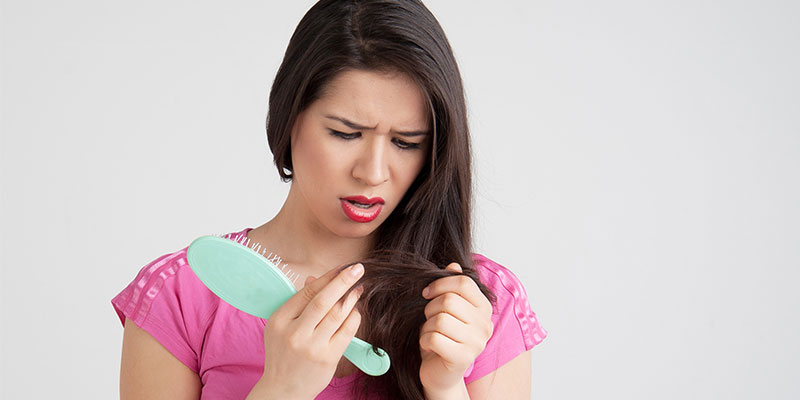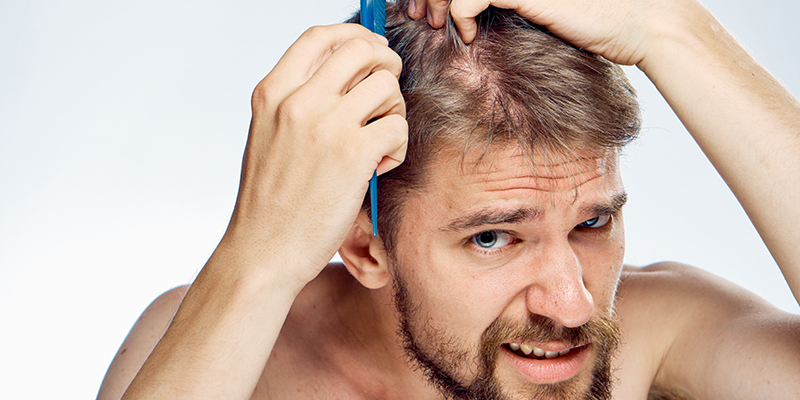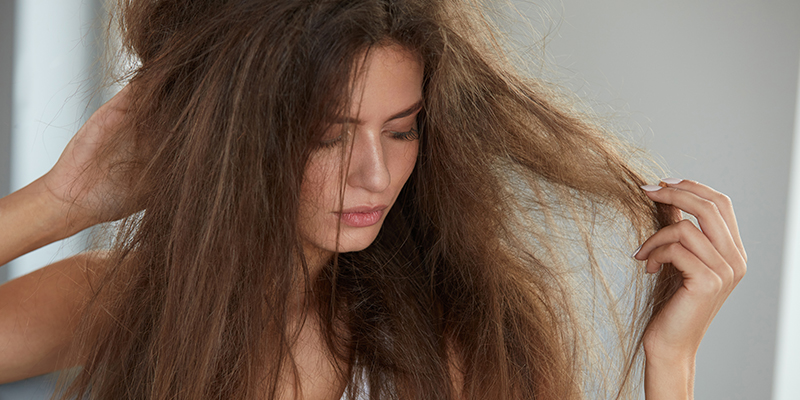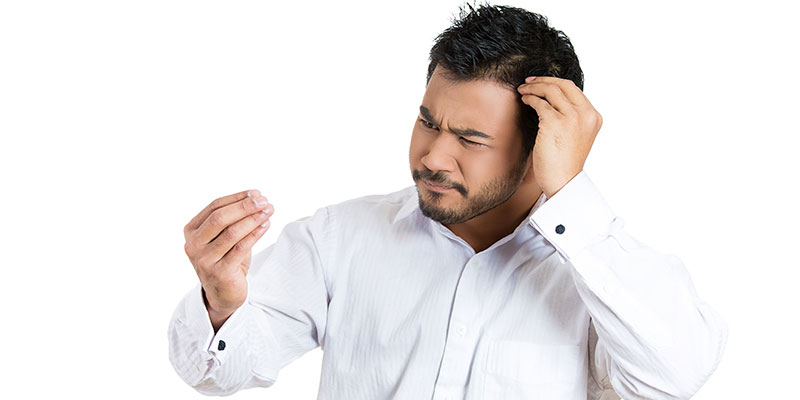In This Article
Dandruff Causes: Top Triggers, Symptoms & How to Stop It Naturally
If you’ve been scratching your scalp due to annoying flakiness and wondering, “what causes dandruff?” then you’ve landed in the right place. A largely harmless condition, dandruff can cause distress and embarrassment. It can often be simply managed or might sometimes require advanced solutions. Let us learn about the common causes of dandruff on hair, possible ways of prevention, and the effective treatment options available.
In This Article
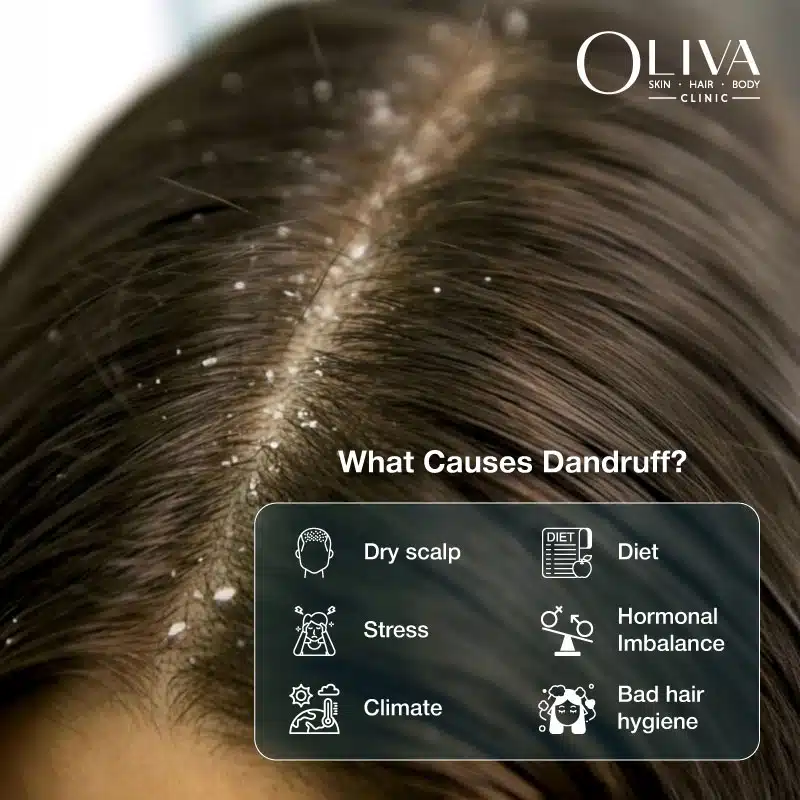
What Is Dandruff?
Dandruff is a common condition that causes shedding of dead skin cells from the scalp [1]. It can be accompanied by mild to and acute itchiness. It is non-contagious and mostly not a serious medical concern. However, it can result in discomfort and cosmetic frustration.
What Causes Dandruff On Hair
The cause of dandruff on scalp can range from dry skin, stress or incompatible hair products to microbial overgrowth, among others. Though the root cause of dandruff has still not been conclusively found, research has linked several factors to increased dandruff production on the scalp.
What Causes Dandruff?
Let’s take a look at the possible causes of dandruff on hair:
-
Oily Skin:
Excess secretion of oil (sebum) on your scalp can lead to dead skin build up. This can result in the increase of dandruff-causing fungi and cause the scalp skin to shed more rapidly.
-
Malassezia:
If you’re wondering about the fungus that causes dandruff, it’s essentially a yeast called Malassezia globosa which is naturally present on the scalp. While the species itself is not responsible for causing dandruff, it feeds on scalp oils and produces oleic acid [2]. This by-product is responsible for causing itchiness, inflammation and flaky white or yellow scales.
-
Dry Skin:
Lack of sufficient moisture can irritate the scalp and accelerate the natural shedding of skin, causing small white dandruff-like flakes to appear. However, dandruff scales are larger, greasier and may not entirely result from dry scalp alone.
-
Irregular Shampooing:
Contrary to the popular notion that frequent shampooing can be the cause of dandruff on scalp, not washing hair enough might actually make it worse [3]. This is due to excessive oil and dead skin pile-up on the scalp. Use of a medicated shampoo that contains ketoconazole, zinc or selenium sulfide can help with treatment of dandruff.
-
Contact Dermatitis:
Contact dermatitis is an allergic reaction of the skin to certain irritants. On encountering allergens in hair products like dyes, shampoos or styling agents, your scalp skin can experience redness, itching, and peeling.
-
Diet:
Diets high in sugars and/or low on B vitamins, zinc and omega-3s can potentially cause dandruff on scalp. While high sugar diets can increase chances of scalp inflammation, lack of hydration and essential vitamins and minerals in daily diet can aggravate the symptoms of dandruff.
-
Stress:
High stress levels can lead to increased androgen production and a compromised immune system, which can make the scalp oilier and more inflamed. This allows Malassezia to grow unchecked, feeding off the greasy scalp, and triggering increased irritation and shedding of skin cells.
-
Haircare Products:
Shampoos and other haircare products high in sulfphates, alcohol, mineral oil and fragrances can be another cause of dandruff flakes. Such products rip necessary oils and moisture off your scalp, making the skin irritated and more prone to shedding.
-
Scalp Irritation:
An irritated scalp due to sunburn, scratching or excessive heat styling can cause dryness and sensitivity, increasing the chances of dandruff on hair.
-
Ageing:
Usually, dandruff is experienced by young adults, even persisting through middle age. However, as one ages, scalp skin tends to get drier, making people with inherently dry skin more susceptible to dandruff in old age.
-
Hormonal Imbalance:
Any imbalance in the hormones controlling sebum production on the scalp can lead to excess oil secretion that encourages Malassezia overgrowth. This can happen because of stress, puberty, pregnancy, or menopause.
-
Seborrheic Dermatitis:
One of the excessive dandruff causes can be a chronic medical condition called seborrheic dermatitis that affects scalp, face, chest and back. It primarily results from increased oil production and the overgrowth of Malassezia on the affected areas of skin [4]. Seborrheic dermatitis on the scalp can cause scaly patches with mild to severe inflammation that may sometimes become sore [5].
-
Bad Hair Hygiene:
Not washing hair at regular intervals leads to oil and dead skin buildup, which causes Malassezia fungus to rise and cause dandruff flakes.
-
Climate:
Both cold and dry as well as hot and humid climates can lead to dandruff. While dry air during cold strips the scalp of vital moisture, hot and humid conditions provide conducive environment for the growth of Malassezia.
-
Eczema:
Eczema is a condition that causes dry, sore and flaky patches on the skin that cause extreme itching in the affected areas [6]. Scalp eczema is mostly caused by seborrheic dermatitis.
-
Product Sensitivity:
Similar to contact dermatitis, the use of unsuitable products on the hair can lead to an adverse reaction on the scalp. This can lead to itching, dryness, and skin shedding.
Foods That Cause Dandruff
As mentioned earlier, what you eat can directly affect your scalp health. Some foods that may cause dandruff include sugary substances, full-fat dairy products, spicy foods, and refined carbs, among others. Here’s a list of foods that can be the internal causes of dandruff:
-
Sugary Foods and Drinks:
Foods having high glycemic index (GI) can cause and even worsen inflammation, which is a major cause of dandruff. Such items in your diet offer little to no nutritional value while spiking insulin levels that can cause redness, itching and flakiness of the scalp.
-
Refined Carbohydrates:
Simple carbs also affect the body in the same way as high-sugar foods, which promote inflammation. Their undue presence in the diet can lead to increase in yeast growth on the scalp, causing symptoms of dandruff.
-
Foods High In Unhealthy Fats:
Saturated and trans fats lead to insulin spikes, which in turn promote hormone surges that can prompt increased sebum production. This can result in oily scalp, yeast overgrowth and, hence, dandruff.
-
Dairy Products:
Dandruff symptoms might get aggravated in some individuals with high consumption of dairy products. This might be due to hormones or certain allergens present in dairy products that can possibly intensify scalp problems. To avoid the risk, switching to dairy-free alternatives such as almond or oat milk can be beneficial.
-
Processed Foods:
High levels of salt and preservatives in processed and ultra processed foods can disrupt the natural environment of the scalp by causing hormonal imbalances. This can increase sebum production and become the cause of dandruff on scalp.
How To Prevent Dandruff?
To prevent dandruff, it is important to eat a balanced diet and make suitable lifestyle changes such as:
- Washing hair twice a week with a medicated, sulfate-free mild shampoo.
- Including omega-3s such as salmon, tuna, healthy fats like flaxseeds, peanut butter, walnuts, avocados, as well as zinc and biotin in your diet.
- Adding more nutrition and fiber-rich fruits and vegetables to your diet can also help prevent dandruff.
- Limit the use of heat styling products and chemicals on your hair to preserve moisture and good oil balance on the scalp.
- Drink those flakes away by consuming at least 2-3 liters of water daily to keep your scalp well-hydrated.
- Effectively manage stress and find ways to relax, rewire and revive.
When To Visit a Dermatologist?
It might be best to consult a specialist if you are experiencing acute, persistent and intense symptoms of dandruff such as:
- Swollen scalp
- Excessive itching and inflammation
- Severe dryness or flaky patches on scalp and other body parts
Advanced Treatments to Get Rid of Dandruff
Usually, over-the-counter medicated shampoos can successfully treat mild to moderate dandruff at home. Using these shampoos twice or thrice a week can control dandruff and provide relief from its symptoms. The active ingredients present in these shampoos work by either killing or slowing the excess yeast growth on the scalp. To find medicated anti-dandruff shampoo, look out for ingredients like ketoconazole, pyrithione zinc, salicylic acid, coal tar, or selenium sulfide. At Oliva Skin and Clinic, we offer the cutting-edge Anti-Dandruff (Scalp Refine) Treatment. Carefully designed by expert dermatologists, Scalp Refine provides a medically tested and holistic solution to all your dandruff woes.
Why Choose Oliva Clinic for Anti-Dandruff Treatment?
Oliva offers end-to-end treatment and support in your journey to a dandruff-free scalp. The top reasons to chose Oliva Clinic for anti-dandruff treatment are:
- Medically Regulated Procedures: Oliva adheres to global standards of medical regulations and maintains high hygiene and care standards.
- Steroid-Free Formulations: Offering clinically proven treatments, our motto is to provide science-backed procedures with high precision and uncompromised safety. We use clinically certified serums, free from harsh chemicals, suitable to even the most sensitive scalps.
- State-of-the-art Technology: All treatments at Oliva make use of the latest FDA approved equipment and advanced technology for effective, safe and inclusive outcomes.
- Highly Experienced and Renowned Dermatologist: Oliva takes pride in its team of eminent and highly qualified medical professionals who continuously undergo rigorous training to uphold high standards of personalised care. With expertise in a wide range of skin and hair concerns, our dermatologists are highly trusted specialists across the nation.
- Thorough Consultation and Customised Treatment: Our unique three-stage process involves extensive consultation, including comprehensive scalp analysis and preparation of a highly tailored treatment plan.
- Proven Results: Our clients have consistently reported overall improved scalp health and highly successful outcomes of the treatment. Their trust speaks louder than any claim.
Takeaway
Dandruff is essentially a harmless skin condition that can be caused by several underlying factors. Using medicated shampoos and maintaining a healthy diet and lifestyle can help in effectively controlling this condition. Nevertheless, it is important to remain aware of the symptoms and seek expert advice if they become severe. Oliva Skin and Hair Clinic offer bespoke medical-grade solutions that holistically treat dandruff and promote healthy scalp conditions. If you’re looking for advanced anti-dandruff treatment, book a consultation with our expert dermatologist now to receive effective and long-lasting relief.


